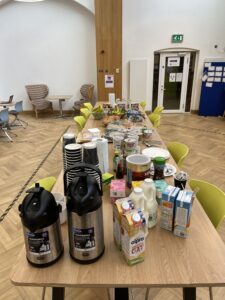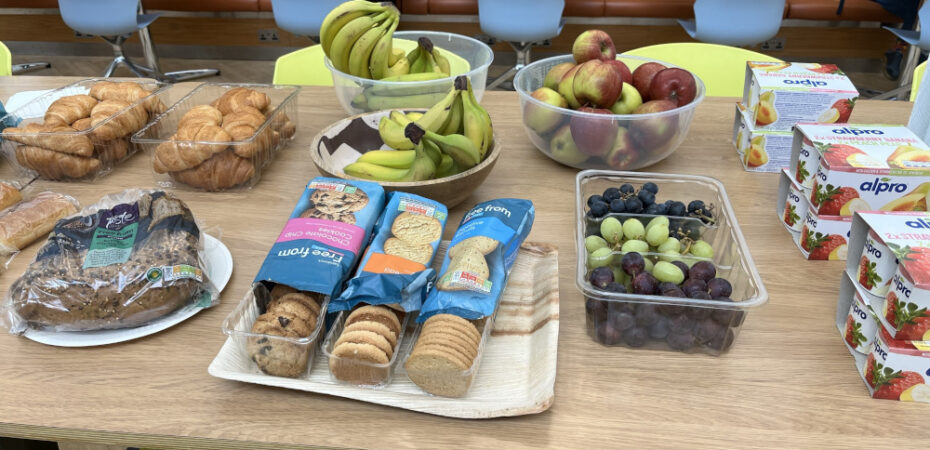
In this post, Jean O’Donoghue, Adrian Penny and Jessica Thackery from the School of Chemistry share their how-to guide on running a Breakfast club, including shopping list examples, pricing and work-load allocation. This post is part of the Student Voice in Practice series.
Jean: Head of Student Experience, and perennial student voice optimist
“Could the entire structure of this course be changed please?”
“This topic is just boring why do we have to do it?”
Sometimes responding to the student voice is not easy! Our students have great creative ideas that we just struggle to deliver within a time-frame that feels meaningful.
But then sometimes…
“I was speaking with … some other School Reps, and for LLC they have managed to secure free breakfast for the students once a week. I was wondering if we could have a meeting to potentially discuss this for School of Chemistry? I believe this would elevate the student experience and I believe boost attendance amongst other things. Looking forward to hearing back, Jessica”
Jessica Thackeray, our UG School rep had emailed me and, at last, I thought: “Yes! We can deliver that, and relatively quickly, but let’s hear more.”
In the School of Chemistry, along with the more usual Student-Staff Liaison Committees, we have had a tradition of speaking with our School representatives (reps) on a semi-regular basis. Jessica and I had met before term started. We talked about fixing furniture in our social space, and the new exceptional circumstances policy and our shared nervousness that it would all go okay in implementation. These regular chats are something that has always been encouraged by our former Director of Teaching (Dr Chris Mowat – now the new Dean of Students at College of Science and Engineering). These chats are used to explain upcoming policy, bring our key reps into the leadership of student experience and, more importantly, help to break down barriers to School reps being able to raise new ideas with us.
And so… Jessica had had this great idea, and we agreed to meet to chat about it.
The benefits of breakfast, and the boost to student community are well-described. So, what we thought we’d focus on here is a how-to guide in case any other Schools or departments wanted to do something similar.
Jessica and I discussed the practicalities and agreed on some key principles that we wanted from the free breakfast:
- To be available for everyone, all students UG and PG
- As many dietary requirements catered for as possible
- Vegan / dairy-free options for butter/milk
- Gluten-free options for bread-products
- To run from 8:30am-10:30am to be ready when doors open at 8:30am so folk could get something before 9am lectures or labs, with a second drop of breakfast goods at 9:30am for 10am starters.
- To include “grab and go” options, e.g. cereal bars.
I asked Jessica to check out how EUSA ran the breakfast in terms of a per head cost, and how many people they catered for. She came back with all the details:
They are supplying for 100 people, with £1.10 per head, and £1.30 including staffing.
They supply bread, jam, butter yoghurt, fruit, porridge pouches/pots mainly.

We decided we would cater for 50 people (we have 650 taught and 200 research students) as a start, and pretty much copy the EUSA menu and price estimate – so approx. £60 / week.
Adrian: Chief caterer, Sainsburys wrangler, feedback getter and all-round breakfast club guru
Together, we agreed on a well-balanced selection of breakfast items to trial. If you order from a supermarket, look out for items on special offers (e.g. Nectar prices) to get more bang for your buck without sacrificing quality. Below is a sample shopping list that we started with (we bought tea and coffee in bulk instead of weekly shops):

We’ve continuously gathered students’ feedback by informally chatting to them at the breakfast, making a short survey available via QR code and seeing what runs out the fastest!
Our menu has evolved to include more diverse toppings, pastries, juice and herbal teas. We print out and display student’s feedback at the breakfast to show what’s been acted upon. It also pays to keep your finger on the pulse. We did a special edition of the breakfast to celebrate pancake day!
To alleviate staff workload, we agreed to have students volunteer to help tidy-up. Our wonderful UG rep, Jessica, made a rota for which she’s been helping recruit volunteers. We’ve found that the balance of staff setting up and students tidying up the breakfasts works really well, and helps it all feel like a co-owned activity.
We decided to keep running the breakfast during exams and so far, have seen strong signs that PG students would like it to continue over summer. Many services and facilities close over summer, so it can be important to keep initiatives like this available to make PG students feel seen and valued.

Jean, Adrian & Jessica: The breakfast team
Would we recommend Schools do this for their students? Yes, absolutely! The feedback has been great, and once you’ve got your regular order set up, it’s pretty easy to run. Students’ feedback reflects the breadth of benefits from a breakfast club: a chance to catch-up with friends; a great energy boost; and extra motivation for their 9ams!
Good luck!
 Adrian Penny
Adrian Penny
Adrian works closely with colleagues in the Chemistry Student Support Team and Teaching Office to ensure that all students feel welcomed and supported throughout their studies in the School of Chemistry. Adrian is also involved in the delivery of community events at programme, cohort, and school-level, including the free breakfast. He continuously looks to gather feedback to reflect the student voice in these initiatives.
 Jean O’Donoghue
Jean O’Donoghue
Jean is the Head of Student Experience at the School of Chemistry. She leads the student support team and oversees all student services in the School. Her focus is on ensuring that all students feel empowered to use their university experience to discover and achieve their goals. As a result, she is passionate about promoting and improving EDI, accessibility, wellbeing, community and the student voice.
 Jessica Thackery
Jessica Thackery
Jessica is the Undergraduate School of Chemistry Representative 24/25, acting as the voice of Chemistry undergraduates and working to improve both the academic and wellbeing experience at the University. She collaborates with staff to ensure student feedback is heard and helps lead initiatives such as free breakfasts to promote a more inclusive and supportive environment.’


